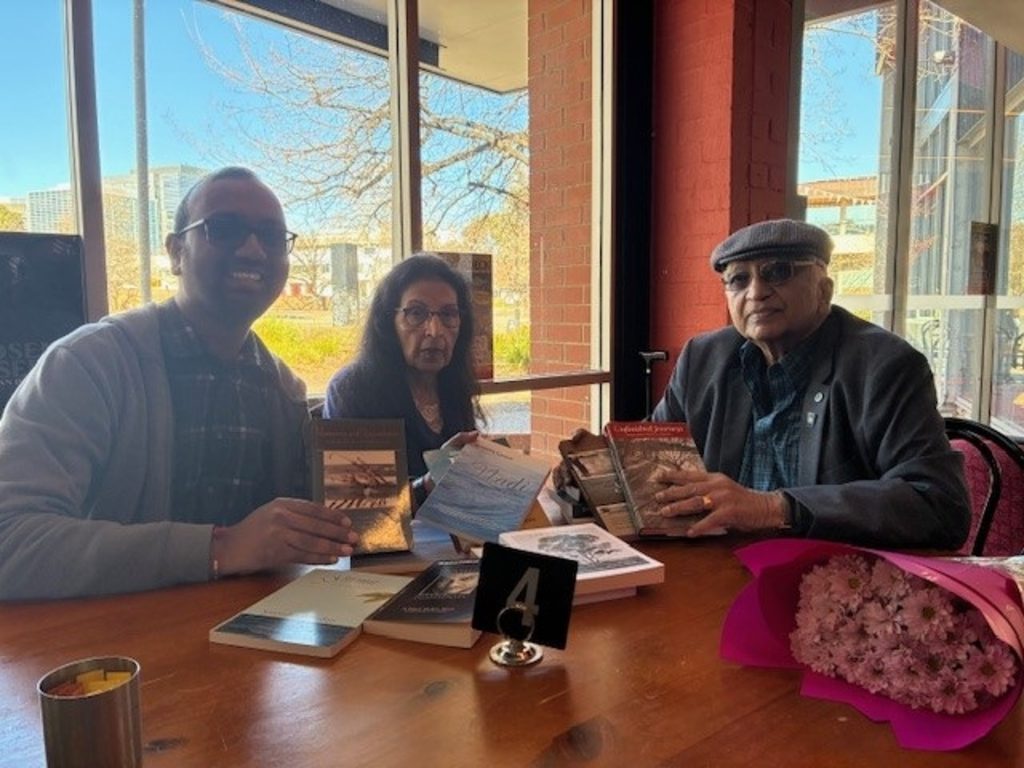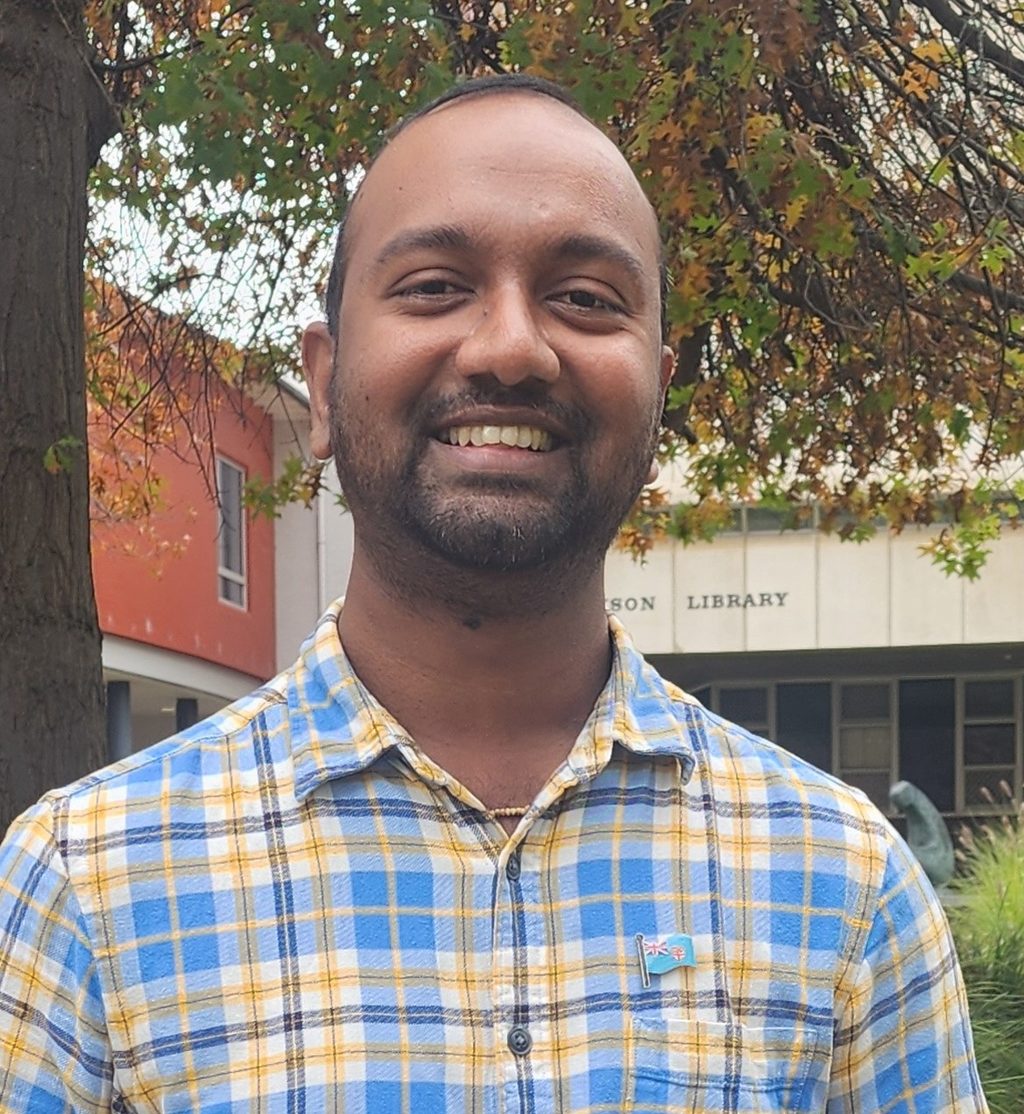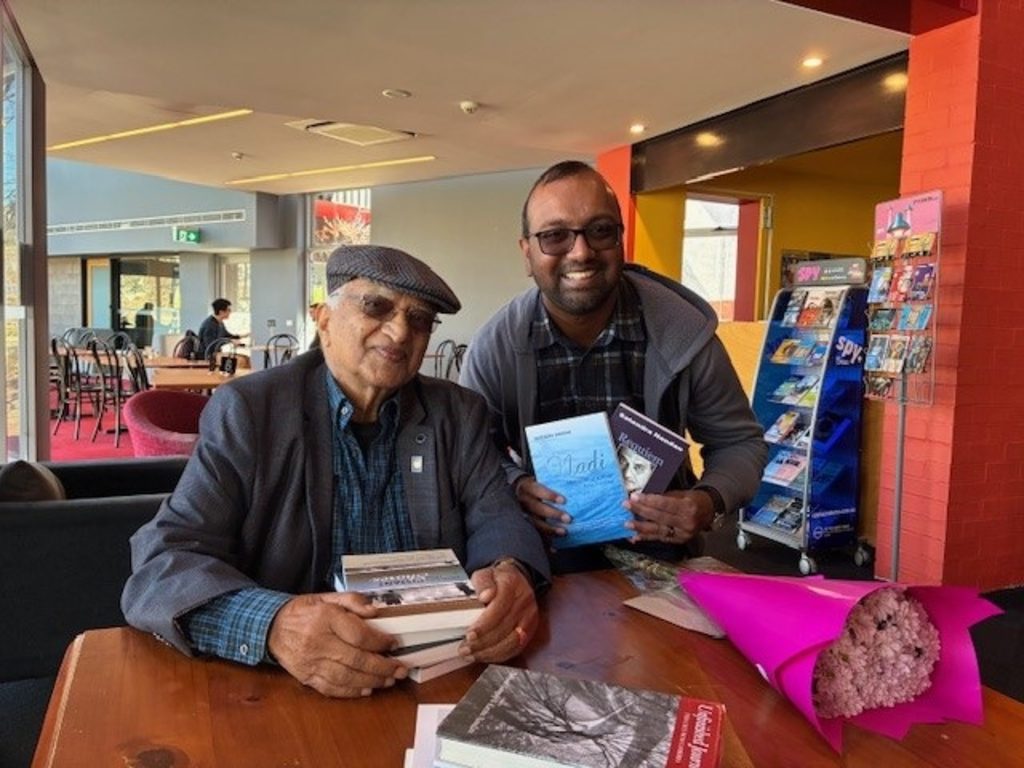In 2004, I was a high school student at Nadi’s Swami Vivekananda College where I read and was taught Satendra Nandan’s A Pair of Black Shoes. This short story until today is synonymous with all high schoolers in Fiji for its humour, lessons and relevance to the Fijian way of life. It’s interesting how life plays out for exactly 21 years later, I had the opportunity to not only meet Emeritus Professor Satendra Nandan but also to have a talanoa over coffee with his wife Dr Jyoti Nandan in Canberra this August. We met up on a Tuesday morning at The Street Theatre where a year ago Nandan’s book LIFE Journeys: Love and Grief was launched by Professor Will Christie, HRC, ANU, chaired by Professor Peter Putnis. This book was also submitted for the ACT Book of the Year ’23.
I WAS interested to ask him about his famous short story and how A Pair of Black Shoes came about. He smiled as I posed this question and happily narrated writing this piece during his PhD days. When he was offered a scholarship to study in India, his father took him to a shoe shop in the one-way main street of Nadi Town more than 50 years ago. He was overwhelmed by the feeling of owning his first pair of shoes that he held them protectively using both hands — in his arms. The shopkeeper had made his father purchase two sizes bigger because he suggested Nandan would grow into it. He recalled walking near the Nadi taxi stand, walking clumsily, careful not to fall, when the drivers remarked “hey ladka, pahila time juuta pahina hai ka”(hey boy is it the first time you are wearing shoes!). His father had told everyone in the village that his son was going to India to be personally taught by the first Prime Minister of India, Pandit Jawaharlal Nehru. This made his father popular in the village, and he was offered grog everywhere he went. However, he did have an audience with Nehru when studying in India as he enjoyed meeting and interacting with international students.
Despite publishing more than 20 books, this short story remains his signature piece. When Prof Nandan was in Fiji’s 2013 Constitutional Review Commission, he went all over Fiji and people kept talking about this work. One incident he laughingly told was when some ladies at the review commission forum said to him that they thought he had passed away. He told them that he was obviously very much alive and in good health!
As talanoa norms, our conversation touched on a number of topics. Both of us are originally from Nadi, Fiji. We attended the same high school which was Shri Vivekananda High School for Satendra by the Nadi River and it became Swami Vivekananda College by the time I attended it in my village Malolo, Nadi. The two of us completed our PhDs from Australia and have a love for reading and writing. Nandan left Fiji in December 1987 to take up a fellowship at the Humanities Research Centre, Australian National University. Subsequently, he joined the University of Canberra where he became a professor in cultural and creative disciplines. For his contributions in literary fields, he was made Professor Emeritus in 2004.
In 1987, he lost two jobs in two days — he told me that this must be a significant moment in history. The first was as a University of the South Pacific academic, the second being a Minister for Health, Social Welfare and Women’s Affairs in the Labour Government of Prime Minister Dr Timoci Bavadra. With a deep sadness in his voice, Nandan shared with me that he still hasn’t recovered from the two coups of 1987, and this is clearly evident in his writings. His widely read book on the first Fiji coup in 1987, Six Nights in May, first published in 2018 by the University of the South Pacific Press, will be republished by Pacific Studies Press next month. In 2005, he resigned from the University of Canberra and returned with his wife Dr Jyoti Nandan, to help set up The University of Fiji where he was the foundation Dean of the Faculty of Humanities and Arts and the Director of the Gandhi-Tappoo Writing Centre until 2012.
On this winter Tuesday morning, I found Satendra Nandan to be Fiji’s flag bearer to the world for literature. He is truly the Rabindranath Tagore of the South Pacific. His passion for promoting Fijian writers was vivid during our discussions. He continues to guide my writing journey and gifted me several of his rare collections of books with signed notes. In his book, Nadi: Memories of a River — Faces in a Village, he affectionately scribbled “Dear Prashneel, our childhood is our history: the rest is memory, Best wishes, Satendra.” This is what humility ought to look like. When you meet your guru role model, you should be left in awe and mesmerised by their presence and not belittled. For Nandan, made me feel like a worthy scholar, and took time to praise my writings and intellectual works thus far.
If you are familiar with his works, you will recall poems, essays and books dedicated to the love of his life, Dr Jyoti Nandan. Sitting with them over coffee made me feel that their relationship is solidified in commitment and appreciation for each other’s work. They easily complement each other in their different spaces, and you can be reassured they depict true love in its purest form. As a father, he spoke fondly of their three children: Rohan, Gitanjali and Kavita. He stands out to be a celebrated author and has received several international recognitions, the most recent being a book on his poetry published last month in India, Leaves of the Girmit Tree: The Poetry of Satendra Nandan. This 200-page volume was authored by Professor Deepti Joshi and will be published in Australia and Fiji next year.
Professor Nandan was Fiji’s first Labour member of Parliament and helped found the Labour Party of Fiji. He was elected to the Fiji Parliament twice: 1982 and 1987. He narrated the story to me when he was invited to recite a poem during the visit of India’s third Prime Minister Indira Gandhi to Fiji in the 1980s. He said his mother was in the audience — she sat in the front row and when he read his poem The Ghost, both the Prime Ministers, Ratu Sir Kamisese Mara and Mrs Indira Gandhi had tears rolling down their cheeks. Here are a few lines from the epic poem:
Pity not me then
Nor mourn for a dying, decrepit man:
Think of what I was
And what you can be
For I only hope
As I see you grope
Your journey from here
Will be without fear
As mine might have been…..
No matter how much time one gets to spend with the legendary writer, it cannot be enough. In the two-hours talanoa session at The Street Theatre in Canberra, I reassembled someone who had finally found the treasure he had been searching for all his life, but then now was the opportunity to find out its origins. Professor Nandan diligently satisfied my curious mind for he is Fiji’s national treasure as well as that of the South Pacific’s.
Satendra Nandan’s new book — POEMS – 1975-205: Waves in the Wounded Sea (pp.606), will be the first volume of its kind by a Fijian-Australasian writer of the Indian indenture heritage.
The book will be launched in September this year.
Dr Prashneel Goundar, Dr Jyoti Nandan and her husband Professor Satendra Nandan. Picture: SUPPLIED


